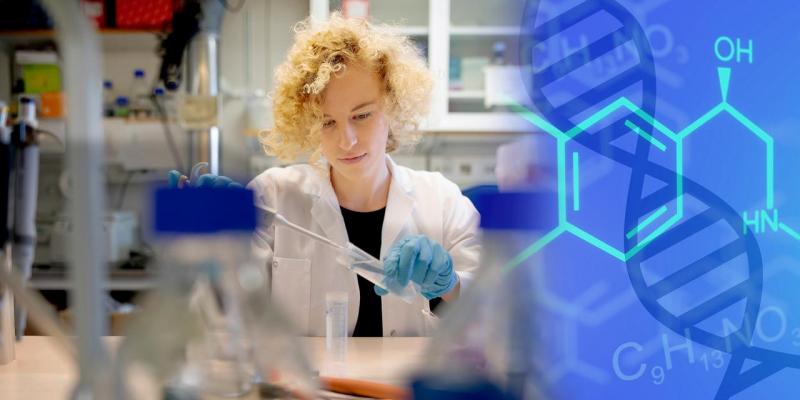About
The Chemistry-Biology Interface (CBI) Predoctoral Research Training Program is a unique multidisciplinary Ph.D. training program that trains students in the underlying chemical principles which govern biological processes with the goal of equipping students with the chemical knowledge to solve biological problems. This dynamic approach exposes students to research opportunities outside of their current area of expertise, and provides mentorship and professional development opportunities within the chemistry-biology interface. Funded by the National Institute of General Medical Sciences (NIGMS), CBI is an NIH NRSA T32 Institutional Research Training Grant program which has existed at UCLA since 1993.
Faculty mentors come from the Schools of Medicine, Engineering, Life Sciences, and Physical Sciences and are trained in areas of expertise as diverse as Chemistry and Biochemistry, Psychiatry, Molecular Biology, Physiology, and Pharmacology. The diverse set of distinguished faculty who participate in the training grant's leadership contribute to a track record of student success. Students with a Biology focus choose a Chemistry Training Faculty member, and students with a Chemistry focus choose a Biology Training Faculty mentor to act as collaborator and mentor. Students work with their mentor and collaboratively with other students on a variety of projects, and all students are exposed to cutting-edge, intensive laboratory research training within their own specialization and in outside areas of expertise. Each student's course of study is individually tailored to suit their interests, and the training grant provides a launching pad for varied careers in academia, private industry, and consulting.
Research Interests
Faculty and trainee research is richly varied in its application of interdisciplinary methodology to investigate biological problems. Much of the research funded by the grant is within the fields of computational chemistry, protein synthesis, and molecular imaging.
Some examples of faculty research specializations include:
- Polymer synthesis applied to biology and medicine
- Biochemistry of aging and metabolic regulation
- Investigation of viruses from a physical sciences point of view
- Therapies and vaccines for HIV
-
Study of proteins by X-ray diffraction and computational methods
-
Mitochondrial biogenesis
-
The serotonin neurotransmitter system's modulation of complex behaviors
The grant's focus is intentionally both broad and directed, as the study of biology at the molecular level is applicable to a range of problems, especially in the healthcare field. With the support of generous NIH funding, CBI research at UCLA has expanded the fields of rare disease study, cancer research, aging, and the delivery and efficacy of pharmaceutical drugs.
Program Goals
The stated goals of the training grant are as follows:
- Train graduate students in the language and techniques of research at the interface of chemistry and biology. Specifically, chemists will learn to be able to critically evaluate papers, be familiar with techniques and be able to rigorously discuss research topics in biology, and vice versa.
- Teach students the background to understand both the fundamentals and cutting edge research at the chemistry biology interface to enable them to distill this information in order to independently apply it to their own research and to develop new ideas.
- Enable students to hone their speaking skills and to work effectively in teams, especially with people in biology for chemists and vice versa.
- Instruct students about ethical and responsible conduct of research so that they follow the ethical principals in their own research and hold these standards to others
- Educate students on the fundamentals of rigor and reproducibility in order to apply this to their own research and enable identification and interpretation of these factors in the work of others
- Empower students to develop to their full potential professionally, providing them with all the tools necessary to make informed and successful career trajectory decisions
- Deliver additional mentoring and oversight on each trainee to retain and enable them to graduate within the average time period for graduate students at UCLA
- Provide an inclusive, supportive and diverse environment with approximately equal numbers of chemically and biologically oriented students, equal numbers of males and females, and 30% persons from underrepresented groups, as well as individuals with disabilities that have a strong identity as the UCLA CBI both as trainees and as alumni.
Eligibility
Graduate students in research at the interface of chemistry and biology may apply after their first year and must be a US Citizen or Permanent Resident. Non-permanent residents may apply as an Associate.
CBI accepts highly qualified graduate students in any department at UCLA whose research plans (1) have a strong organic, physical, or analytical chemical component and (2) involve a project that addresses significant unsolved
problems at the Chemistry/Biology interface. Students from all academic fields in PhD programs at UCLA are encouraged to apply. In the past, grantees have come from Biological Chemistry; Chemistry & Biochemistry; Pathology and Lab Medicine; Microbiology, Immunology and Molecular Genetics; Molecular, Cell and Developmental Biology, Molecular and Medical Pharmacology; Public Health; and Physiology.
Funding and Benefits
Provided that they remain in good academic standing, students are funded for all three years of the grant. CBI funding covers all tuition fees, as well as a stipend and yearly travel allowance ($300)
Other benefits include a summer internship at a university or private company, retreats and colloquia participation, and various outreach and networking opportunities. Students work with their faculty mentor to attain an internship that aligns with their research and career goals, and work closely on a long-term plan for personal career development.
Students additionally are granted stellar opportunities to meet and interact with leading scientists and researchers in their field during the annually scheduled CBI Day Symposium and during regularly scheduled seminars at UCLA's campus. Students are also encouraged to cross-pollinate and share their research. All CBI grantees are required to participate in the CHEM-206 (Chemistry-Biology seminar) during each year of their grant funding, during which grantees discuss current issues at the interface of chemistry and biology and share research outcomes.


